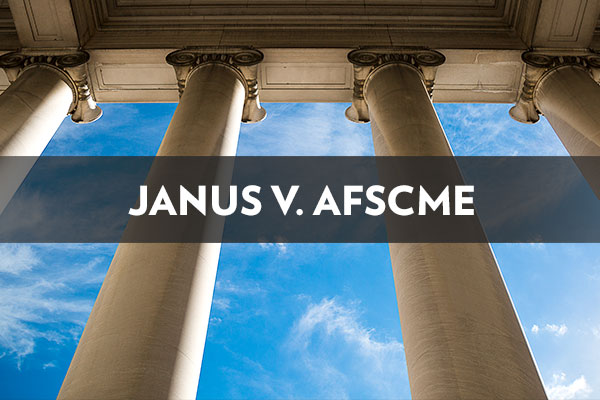Media

Janus v. AFSCME: SCOTUS Upholds Workers’ Rights
Today, the U.S. Supreme Court upheld workers’ rights.
In a 5-4 decision, the court ruled in Janus v. AFSCME that forcing public sector workers to pay union fees—or lose their jobs—violates their First Amendment rights of free speech and free association. This overturns the court’s 1977 Abood v. Detroit Board of Education decision, which allowed unions to impose “fair share” or “agency” fees on workers who didn’t join or support the union.
The fee was meant to protect workers from funding union political activities. The issue, according to lead plaintiff Mark Janus, is all public sector collective bargaining impacts public policy decisions and taxpayer dollars. In other words, for decades the Abood decision allowed government unions to coerce workers to fund fundamentally political activity.
Janus argued this violates his constitutional rights. The justices agreed, and ruled public sector workers should not be forced to pay for the political speech of an organization they didn’t join and with which they disagree.
The decision, delivered by Justice Samuel Alito, claimed that Mark Janus indeed, was “undisputedly injured” by agency fees, which violate “the free speech rights of nonmembers by compelling them to subsidize private speech on matters of substantial public concern.”
States and public-sector unions may no longer extract agency fees from nonconsenting employees. The First Amendment is violated when money is taken from nonconsenting employees for a public-sector union; employees must choose to support the union before anything is taken from them.
What does this mean for public sector workers in Pennsylvania and across the nation?
The court decision establishes a pathway for more than 330,000 Pennsylvania government workers—and 5 million workers nationwide—to regain their constitutional rights. Yet, further steps are needed to ensure this new court precedent applies to Pennsylvanians.
Last year, four Pennsylvania teachers filed a lawsuit challenging union fees. A decision in this case, Hartnett v. Pennsylvania State Education Association (PSEA), can extend the Janus decision to public workers in the commonwealth. If the plaintiffs win, Pennsylvania public sector workers will have a choice.
Tens of thousands of Pennsylvania workers currently paying union fees, including 8,000 teachers and 15,000 AFSCME fee-payers, will be freed from subsidizing union politics.
It is important to emphasize that nothing will change for union members who support and want to belong to their unions. They will simply gain the right to not pay a fee if they no longer support their union and resign.
Today’s Supreme Court decision means eventually all public workers will have a new choice before them—to not join a union without a penalizing fee.
However, due to restrictive union contracts, workers will still have difficulty exercising their rights to resign. Informing public sector workers of their new options and their resignation “window” will take time.
Finally, Pennsylvania public workers are on track to enjoying the workplace freedom all employees deserve.